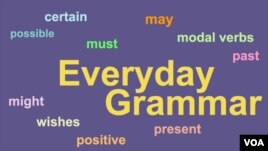31 July, 2015
For VOA Learning English, this is Everyday Grammar.
This week's Everyday Grammar looks at how to use the modals may, must, and might.
Modal verbs (called modals for short) are auxiliary verbs that express a speaker's attitude and the strength of that attitude. There are about 17 modals in English. They have multiple meanings and sometimes overlap in ways that are confusing to English learners. Today we will look at how we use these modals to express how certain, or sure, you are of something.

Google Ngram of "may you"
Degrees of certainty in the present and past
Grammar expert Betty Azar explains that these modals tell us how sure speakers are about what they are saying. A person who is 100% sure uses the verb be as in "I am sick." If they are mostly sure, say 95%, they will use the modal must, as in "I must be sick." When speakers are about 50% sure, they will use the modals may, might, or could; as in "I may be sick. I might be sick. I could be sick."
Might as the past tense of may
Might is used as the past form of may. For example:
"I may take more pictures." (This is a direct quote)
She said she might take more pictures. (This is reported speech)
Notice how may changed to might. Modals change to a past form in reported speech.
Yesterday we had a staff meeting. I looked around the room and noticed my co-worker Anna was not there. I asked, "Where's Anna?" and got three answers from my co-workers.
Jonathan answered, "Oh, she may be making a video in the studio."
Kelly said, "She might have stayed home today."
Adam told us, "She called me to say she was doing an interview at the Capitol this morning. So she must still be working over there."
In this conversation, you can see a change from may to might. May shows the speaker is not sure in the present moment: "She may be making a video." May changes to might to express a possible state in the past: "She might have stayed home." Finally, must expresses a strong certainty: "She must be working there."
People today do not always follow these rules about present and past tense for may and might. You will hear both words to express the same degree of certainty. English speakers still express strong certainty in phrases like, "It must be love."
Listen for the word might in this song by The Cars.
You might think it's foolish
or maybe it's untrue
You might think I'm crazy
but all I want is you
By using might, the singer is expressing about 50% certainty.
Degrees of uncertainty in the future
Now let's look at how we express certainty about the future.
My friend Andy has a test next week. He has studied very hard for months. I told him, "You will do well on the test. Don't worry." I believe with 100% certainty that Andy will pass the test.
On the other hand, Carrie, who has to take the same test, just began studying last week. I warned her, "You might not do well on the test. You should study more this weekend." I am not so sure that Carrie will pass. In fact, I doubt it. I express that future possibility with might.
May is sometimes used to express hope
The idea of possible future events lets English speakers use may to talk about hopes. You will see may on greeting cards and in prayers or religious writings.
A quick look at Google Ngrams shows that few people are using may in this way. Now, it is much more common to hear "I hope that."
The group Celtic Woman sings of their wishes in May it Be:
May it be an evening star,
Shines down upon you.
May it be when darkness falls,
Your heart will be true.
Traditional poems and prayers also use may to express positive sentiments. This is part of an old Irish blessing:
May the road rise up to meet you.
May the wind always be at your back.
May the sun shine warm upon your face.
With that in mind, the Everyday Grammar team says, "May you find our articles useful."
I'm Jill Robbins.
And I'm Adam Brock.
Dr. Jill Robbins wrote this story for Learning English. Adam Brock was the editor.
_________________________________________________________________
Words in This Story
certain - adj. not having any doubt about something; convinced or sure
positive - adj. thinking that a good result will happen: hopeful or optimistic
modal verb - a verb (such as can, could, shall, should, ought to, will, or would) that is usually used with another verb to express ideas such as possibility, necessity, and permission
auxiliary verb - a verb (such as have, be, may, do, shall, will, can, or must) that is used with another verb to show the verb's tense, to form a question, etc.
Now it's your turn. Write a sentence using may, might, or must. We'll check your grammar in the comments section.